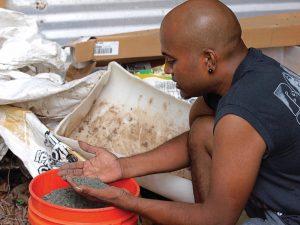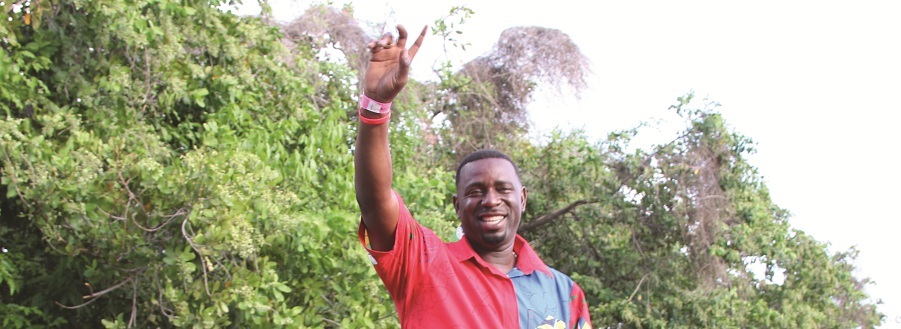Share
We all know that these days it’s hard to find organic foods in our local supermarkets. We are all becoming more aware of what we are eating. The chemicals, the processing, the horror stories of genetically modified everything. Supermarkets are now becoming aware of our wants and needs for more organic fruits and vegetables, and we are turning more often to the local farmers who are able to provide us with a selection of locally grown foods.
Who remembers the days when eating organic was not called organic it was simply just eating from your garden, your grandmother’s garden or even your neighbours garden. The days when, as a child, you would sit and shell peas with your grandma. The excitement of eating fresh ripened tomatoes off the vine. More importantly, can you remember the taste of those tomatoes!
Meet Devon Joseph, his passion for growing organic is infectious, his knowledge and teaching is inspiring. Spend, just a couple of hours with Devon and you will walk away ready to start your urban organic garden immediately.
As we arrived to meet Devon we were greeted with his enthusiastic smile and immediately Devon started to explain his garden to us. Just at the side of the house a small area has been cordoned off with wire fencing, along the fence wraps climbing spinach, inside the fence, a host of edible plants and vegetables all of which are natural to the Virgin Islands. Who knew arugula, spinach, thyme, cilantro and lemongrass can be found growing in the wild on the roadside? If they can grow here in the wild then how hard is it for us to grow these ourselves at home? ‘It’s easy’ says Devon as he has us try each plant. Each leaf is a taste explosion in your mouth, the flavor, the crispness and the freshness. “It’s all about creating a habitat. The gardens you see where everything is all neat and nothing out a place. They have it all wrong. Their garden is out of balance. You need the habitat to help with pests. To help things thrive’
Devon shows us his salad greens. Planted in a recycled pipe that he cut in half. The lettuce is fresh and crisp and nothing like the tasteless, watery thing I buy for my salad from the supermarket. Devon explains the cross planting technique that he uses to help him eliminate the use of any pesticides. By planting lettuce and kale side by side in this planter, the pests have gone for the Kale here and left the lettuce well alone “ so I sacrificed some kale in this pot as the pests preferred that to the lettuce, but I’d rather that than spray everything to get rid of them’
As Devon shows us all his recycled containers his vertical recycled pipe garden, he explains everything in detail. From the ground up, the planting of the seeds, the right soil to use, how to use mulch, dried grass he has collected from cuttings and rock dust from the quarry to provide a nutrient rich soil. He talks to us about crop rotation and the importance of this, even on a smaller scale. He shows us his homemade drip irrigation system for keeping his Chinese Watermelon (Corilla) plant moist, simply a gallon water jug cut in half with a small hole in the bottom that only allows a slow drip to come out, enough to keep the base of the plant moist.
‘All of this’, as he gestures across his garden, ‘can be done by anyone on any scale. You do not need a lot of space. Some pots on your balcony, cut pipes on your wall, if you have a garden great, but if not it does not mean you can’t do this.’ It is simple, you just need to know the basics and I’m happy to help people learn to grow their own food, become more self-sufficient. It’s what we, as a generation, need to embrace, need to continue not just for our benefit but for generations to come’
Devon, originally from Trinidad, studied Agriculture and Animal Husbandry. He moved to the BVI when he was 17 with his family who, when in Trinidad were almost totally self-sufficient for food. Devon had a hard time when he arrived on Tortola, going from growing up in a garden where he would walk barefoot and forage for food, to being in an apartment with no garden. It was his need to eat healthy and grow his own produce that had him looking in the wild for what grew naturally here and as time passed and his love for growing organically has seen him passing on his passion to those around him
Today not only does Devon now have a garden, he has vision. A vision to start the urban organic revolution so let’s join him, let’s get organic and let’s get growing.
Every issue, Devon Joseph is going to let us in on some of his secrets and show us how easy it is for us to get started growing our own foods, proving that anyone can do it and you don’t always need a garden to grow organic. This issue, try his salad mix pot, and why not get the children involved too, it does not need to take up much space and can even be grown on a sunny windowsill!
How to Grow your Salad Mix
Everyone loves fresh salad greens. Whether it be the sidekick for a great sandwich or the star in your favorite salad. It’s a great source of fiber, vitamins, minerals and antioxidants just to name a few. Most of the leafy greens that are used for salads have a shallow root system and grow well in partial shade so this makes it a great candidate for container planting. The containers can be placed on a sunny window sill, deck or patio. These types of plants grow best in partial shade and will bolt (prematurely form seeds) if exposed to direct sunlight.
Things you will need:
- A container with a depth between 4 and 8 inches (too deep is a waste of soil) it can be as wide as you like.
- Pro Mix grow medium or a good quality potting soil.
- Compost or aged manure.
- 1 packet of mesclun seeds, this is a blend of different variety of salad greens.
Step by Step:
Combine grow medium or potting mix with compost or aged manure at a ratio of 3 parts grow medium to 1 part compost. Mix well.
If your container does not have drainage holes make some using a hot knife for plastics or a hammer and nail for metal, this is to help get rid of the excess water around the roots of the plant.Fill your container with the mix and water thoroughly. Let the watered container sit for about 5 mins to allow the excess water to be drained. Sprinkle seeds evenly onto the wet soil as though you are putting sprinkles on ice cream or sesame seeds on top of a bun.
Lightly sprinkle some soil on the top of the seeds and mist with water until top layer is moist.
Place on your patio and enjoy watching it grow and most of all in about 30 days enjoy eating it.
Quick Tip: use only bottled water or rain water to germinate the seeds. The chlorine in the tap water is too hard and can be used after the seeds has sprouted.
Inspired? Let us know how your salad pot grows and how it tastes. Send us your photos.
Having trouble with your garden? Got a question for Devon? Send questions to us via our Facebook page VI Life&Style or email to ……..@vilifeandstyle.com







